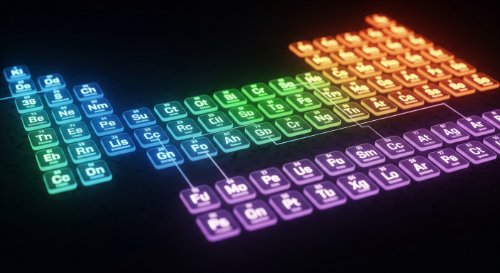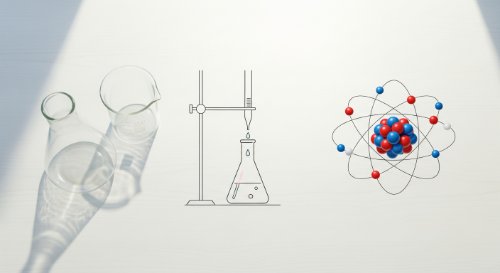Laws of chemical combination - Early Atomic Models | Atomic Structure and Periodicity of Elements - Chemistry (Undergraduate Foundation)
SPONSORED Get Personalized Tutoring NowStruggling with a tough concept or looking to advance your skills? Our expert tutors offer one-to-one guidance tailored to your unique needs.
Get instant support, clear explanations, and practical strategies to master even the most challenging subjects. With flexible scheduling and customized learning plans, success is just a session away.
Book your personalized tutoring today and start achieving your academic goals!
Get Personalized Tutoring NowStruggling with a tough concept or looking to advance your skills? Our expert tutors offer one-to-one guidance tailored to your unique needs.
Get instant support, clear explanations, and practical strategies to master even the most challenging subjects. With flexible scheduling and customized learning plans, success is just a session away.
Book your personalized tutoring today and start achieving your academic goals!
Struggling with a tough concept or looking to advance your skills? Our expert tutors offer one-to-one guidance tailored to your unique needs. Get instant support, clear explanations, and practical strategies to master even the most challenging subjects. With flexible scheduling and customized learning plans, success is just a session away. Book your personalized tutoring today and start achieving your academic goals!
 Atomic Structure and Periodicity of Elements - Chemistry (Undergraduate Foundation)This course provides a complete guide to the modern theory of the atom. It traces the historical development of atomic models, from Dalton's foundational theory to the modern understanding of electronic structure. The material covers subatomic particles, the contributions of Thomson and Rutherford, the Bohr model, wave-particle duality, and culminates in a full treatment of electronic configuration and its direct relationship to the periodic trends of the elements.
A command of atomic theory is the absolute foundation of modern chemistry. The electronic structure of the atom dictates all chemical properties and bonding behaviour. This knowledge is essential for understanding the periodic table, predicting chemical reactions, and is the prerequisite for the study of spectroscopy, materials science, and quantum mechanics.
By the end of this course, you will be able to describe the historical evolution of atomic theory. You will also be able to explain the atom's structure, including the roles of protons, neutrons, and electrons. You will determine the electronic configuration of any element and use periodic trends to predict and justify atomic properties like size, ionisation potential, and electronegativity.
This course is for students who have completed an introductory chemistry course. It is a mandatory prerequisite for any student pursuing a degree in chemistry, chemical engineering, materials science, or physics.
Atomic Structure and Periodicity of Elements - Chemistry (Undergraduate Foundation)This course provides a complete guide to the modern theory of the atom. It traces the historical development of atomic models, from Dalton's foundational theory to the modern understanding of electronic structure. The material covers subatomic particles, the contributions of Thomson and Rutherford, the Bohr model, wave-particle duality, and culminates in a full treatment of electronic configuration and its direct relationship to the periodic trends of the elements.
A command of atomic theory is the absolute foundation of modern chemistry. The electronic structure of the atom dictates all chemical properties and bonding behaviour. This knowledge is essential for understanding the periodic table, predicting chemical reactions, and is the prerequisite for the study of spectroscopy, materials science, and quantum mechanics.
By the end of this course, you will be able to describe the historical evolution of atomic theory. You will also be able to explain the atom's structure, including the roles of protons, neutrons, and electrons. You will determine the electronic configuration of any element and use periodic trends to predict and justify atomic properties like size, ionisation potential, and electronegativity.
This course is for students who have completed an introductory chemistry course. It is a mandatory prerequisite for any student pursuing a degree in chemistry, chemical engineering, materials science, or physics.
This course provides a complete guide to the modern theory of the atom. It traces the historical development of atomic models, from Dalton's foundational theory to the modern understanding of electronic structure. The material covers subatomic particles, the contributions of Thomson and Rutherford, the Bohr model, wave-particle duality, and culminates in a full treatment of electronic configuration and its direct relationship to the periodic trends of the elements. A command of atomic theory is the absolute foundation of modern chemistry. The electronic structure of the atom dictates all chemical properties and bonding behaviour. This knowledge is essential for understanding the periodic table, predicting chemical reactions, and is the prerequisite for the study of spectroscopy, materials science, and quantum mechanics. By the end of this course, you will be able to describe the historical evolution of atomic theory. You will also be able to explain the atom's structure, including the roles of protons, neutrons, and electrons. You will determine the electronic configuration of any element and use periodic trends to predict and justify atomic properties like size, ionisation potential, and electronegativity. This course is for students who have completed an introductory chemistry course. It is a mandatory prerequisite for any student pursuing a degree in chemistry, chemical engineering, materials science, or physics.
 CHM 101: General Chemistry IThis learning track delivers the complete NUC CCMAS curriculum for General Chemistry I. It is a comprehensive programme designed to build a robust, university-level foundation in modern chemistry. The track systematically covers all essential topics, from atomic theory, chemical bonding, and the states of matter, to the quantitative principles of stoichiometry, equilibrium, thermodynamics, and kinetics.
This programme is for first-year undergraduates in science, technology, engineering, and mathematics (STEM) faculties who are required to take CHM 101. It is also essential for any student or professional globally who needs a rigorous and complete foundation in first-year university chemistry for further study or career development.
This track delivers a full skill set in chemical theory and quantitative problem-solving. Graduates will be able to determine molecular structures, calculate reaction quantities, analyse the energetics and rates of reactions, and solve complex equilibrium problems. This programme provides the non-negotiable prerequisite knowledge for all subsequent chemistry courses and for any degree in the physical sciences, engineering, or medicine.
CHM 101: General Chemistry IThis learning track delivers the complete NUC CCMAS curriculum for General Chemistry I. It is a comprehensive programme designed to build a robust, university-level foundation in modern chemistry. The track systematically covers all essential topics, from atomic theory, chemical bonding, and the states of matter, to the quantitative principles of stoichiometry, equilibrium, thermodynamics, and kinetics.
This programme is for first-year undergraduates in science, technology, engineering, and mathematics (STEM) faculties who are required to take CHM 101. It is also essential for any student or professional globally who needs a rigorous and complete foundation in first-year university chemistry for further study or career development.
This track delivers a full skill set in chemical theory and quantitative problem-solving. Graduates will be able to determine molecular structures, calculate reaction quantities, analyse the energetics and rates of reactions, and solve complex equilibrium problems. This programme provides the non-negotiable prerequisite knowledge for all subsequent chemistry courses and for any degree in the physical sciences, engineering, or medicine.
This learning track delivers the complete NUC CCMAS curriculum for General Chemistry I. It is a comprehensive programme designed to build a robust, university-level foundation in modern chemistry. The track systematically covers all essential topics, from atomic theory, chemical bonding, and the states of matter, to the quantitative principles of stoichiometry, equilibrium, thermodynamics, and kinetics. This programme is for first-year undergraduates in science, technology, engineering, and mathematics (STEM) faculties who are required to take CHM 101. It is also essential for any student or professional globally who needs a rigorous and complete foundation in first-year university chemistry for further study or career development. This track delivers a full skill set in chemical theory and quantitative problem-solving. Graduates will be able to determine molecular structures, calculate reaction quantities, analyse the energetics and rates of reactions, and solve complex equilibrium problems. This programme provides the non-negotiable prerequisite knowledge for all subsequent chemistry courses and for any degree in the physical sciences, engineering, or medicine.